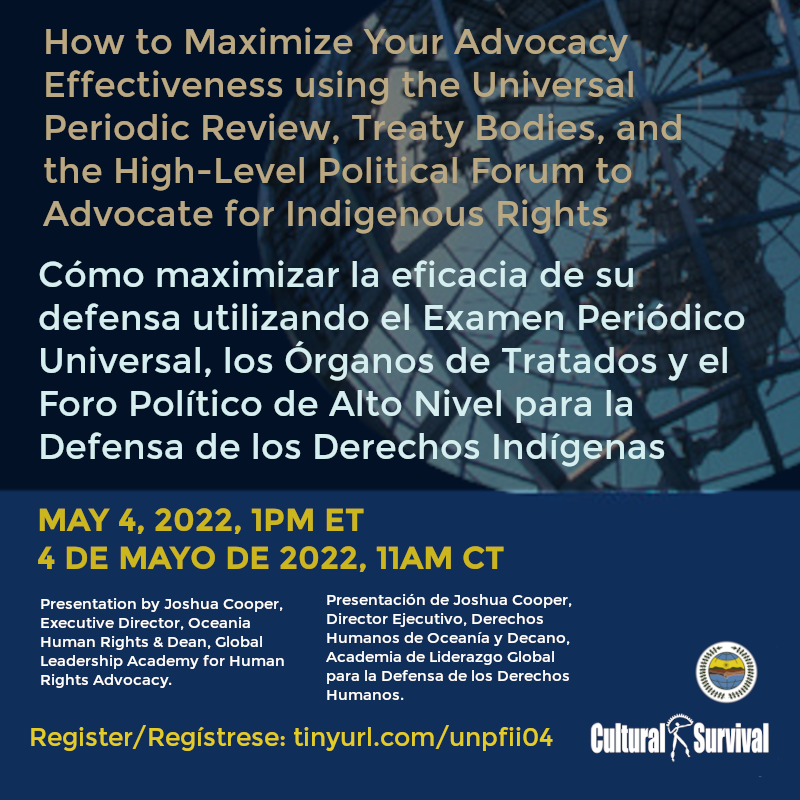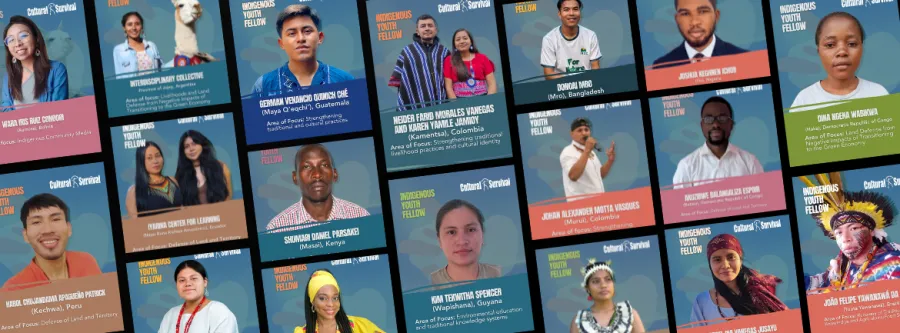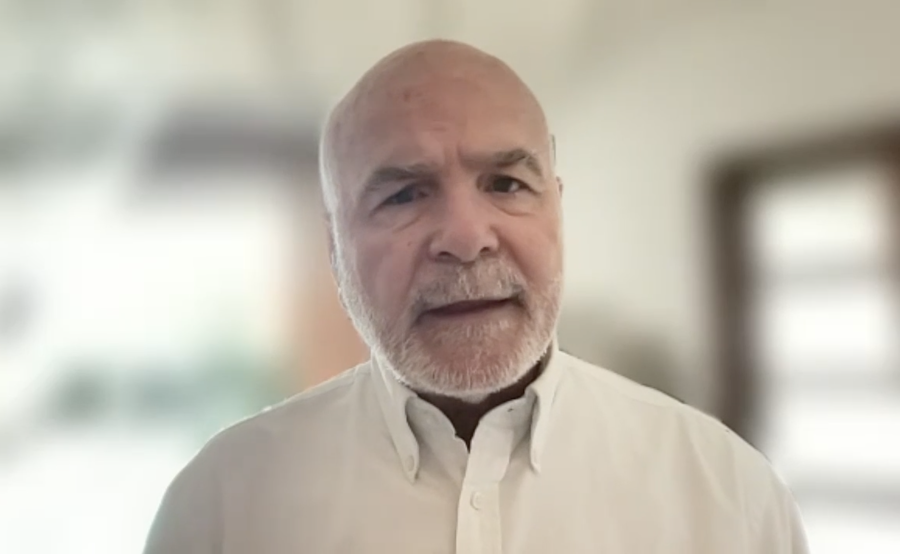
On April 25-May 6, 2022, the 21st session of the United Nations Permanent Forum on Indigenous Issues will take place. Because of the COVID-19 pandemic, this year’s session will be primarily virtual, and its theme will focus on “Indigenous Peoples, business, autonomy and the human rights principles of due diligence including Free, Prior and Informed Consent."
After decades of Indigenous leaders pushing for inclusion and representation at the United Nations, on July 28, 2000, the UNPFII was established as a high-level advisory body to the UN Economic and Social Council by resolution 2000/22. Since 2002, the UNPFII has been meeting annually.
The UNPFII can be utilized by Indigenous Peoples to raise awareness, bring policy change to other UN bodies, and influence how Indigenous rights are implemented at the local and national levels. Over the past 21 years, the UNPFII has coordinated and commissioned over 76 studies, 59 reports, and over 60 publications. Members of the Forum have worked on drafting policies for UN agencies and have made recommendations to other UN bodies.
Some of the greatest achievements over the past two decades have been the networking and alliances built among Indigenous delegates and representatives from all over the world. The relationships, partnerships, and friendships built are core to the global Indigenous rights movement. Aside from the official talks, interventions, panels, official side events, and parallel events, what really also needs to be elevated are the side conversations in the hallways between delegations, UN agencies, funders, and State representatives. This is where true change happens.
Join us in amplifying Indigenous Peoples' voices this year at UNPFII with a series of events and opportunities below.
1. Join the conversation!
What are the pressing issues affecting your Indigenous community?
Create a short video (up to 2 minutes) and post it on Twitter and Facebook using #UNPFII21 #WeAreIndigenous #Proud2BIndigenous.
Share your photos from the past UNPFIIs using the same hashtags.
2. Watch the Livestream of the UNPFII.
The Forum will be streamed at webtv.un.org.
Opening ceremony: Monday, April 25, 2022, 11:00 AM - 1:00 PM ET
Closing session: Friday, May 6, 2022, 3:00 - 6:00 PM ET
Hybrid meetings: 9:00 - 11:00 AM and 3:00 - 5:00 PM ET
3. Attend a UNPFII side event.
The full list of side events is posted here.
Join Cultural Survival at these events below:
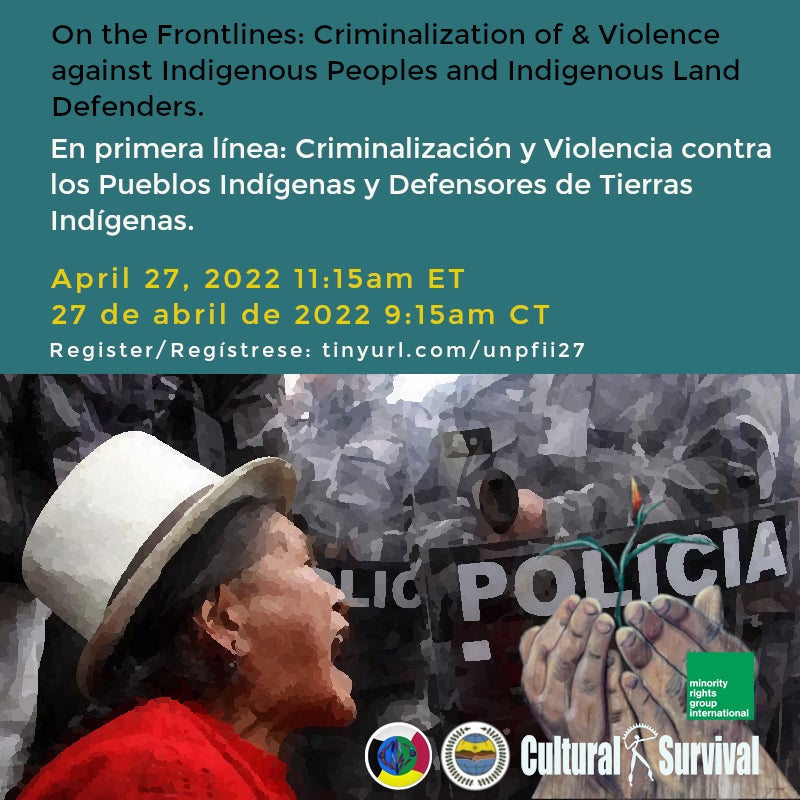
Wednesday, April 27, 2022
11:15am - 12:45pm ET
On the Frontlines: Criminalization of & Violence against Indigenous Peoples and Indigenous Land Defenders.
As the world continues to be threatened by loss of biodiversity at an alarming rate, the pressure on Indigenous territories, which remain biodiversity hubs, is ever increasing. Unfortunately, as Indigenous Peoples struggle to protect, sustainably manage and safeguard their territories they often find themselves on the frontlines and subjects of direct attacks to their safety and well being including displacement all in the name of conservation.
Co-Sponsors: Minority Rights Group and Maya Leaders Alliance of Southern Belize
REGISTER: https://tinyurl.com/unpfii27
Language availability English/Spanish
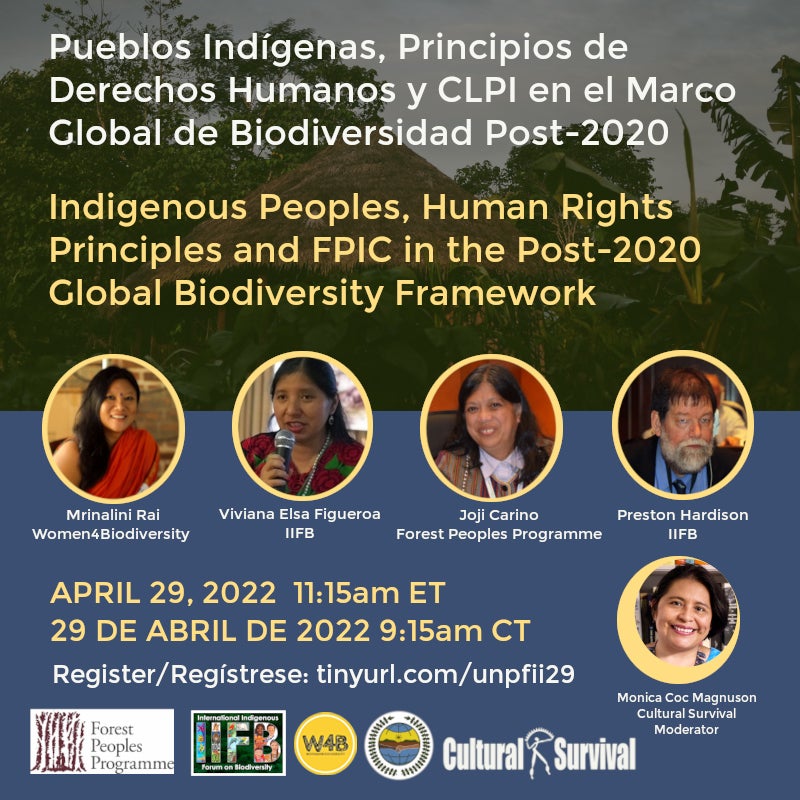
Friday, April 29, 2022
11:15am -12:45pm EST
Indigenous Peoples, Human Rights Principles, and FPIC in the Post-2020 Global Biodiversity Framework
Indigenous Peoples and local communities around the world have the most knowledge about how to live in harmony with nature. Therefore they are key actors in the protection of our Mother Earth and should be seen as a central and cross-cutting part of the entire CBD Post-2020 Global Biodiversity Framework (Post-2020 GBF). Indigenous Peoples and experts will present their comments and results of the past sessions in Geneva on various issues, including traditional knowledge, recognition of and respect of the rights of Indigenous Peoples, Gender issues and the rights of women and youth, inclusion Free, Prior and Informed Consent and Ways Forward.
Panelists:
Preston Hardison, USA, expert and negotiator of the IIFB
Joji Carino, Forest Peoples Programme (FPP)
Mrinalini Rai, Thailand, - Women4Biodiversity
Viviana Elsa Figueroa, Argentina, expert and negotiator of the IIFB
Moderator:
Monica Coc Magnuson, Cultural Survival
Co-Sponsors: IIFB and Women4Biodiversity
REGISTER: https://tinyurl.com/unpfii29
Language availability English/Spanish
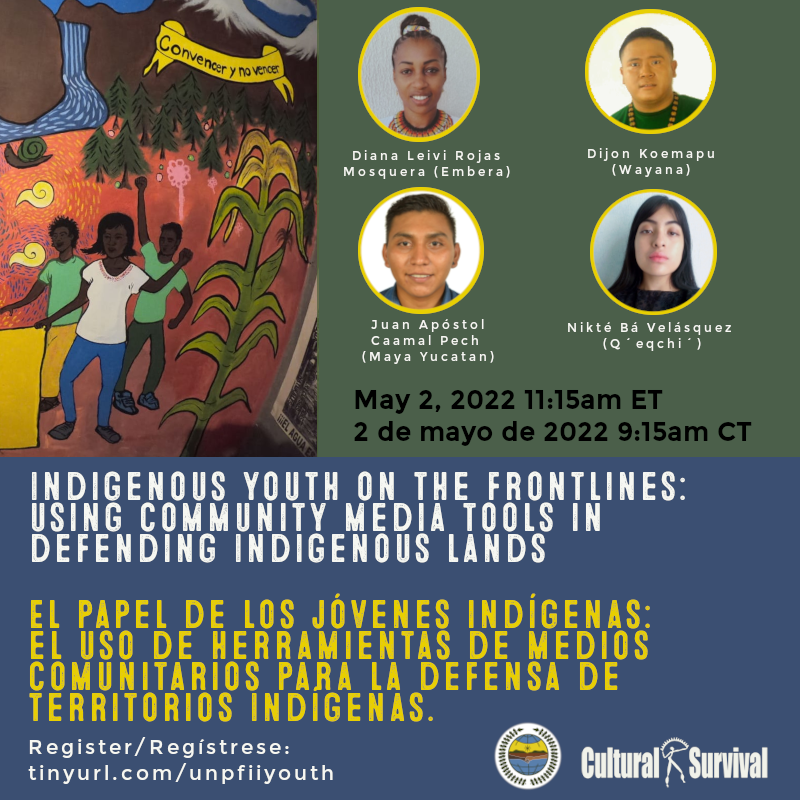
Monday, May 2, 2022
11:15am - 12:45pm ET
Indigenous youth on the frontlines: Using community media tools in defending Indigenous lands.
Panelist will share how Indigenous youth are playing a key role in territorial security of their communities using community media tools in addressing Free, Prior and Informed Consent in protecting Indigenous territories from resource extraction.
Speakers:
Diana Leivi Rojas Mosquera (Embera), Choco Regional Indigenous Council (CRICH) Women's Committee, Colombia
Nikté Bá Velásquez (Q´eqchi´), Guatemala
Juan Apóstol Caamal Pech (Maya Yucatan), Mexico
Wayana youth from Mulokot Foundation, Suriname
REGISTER: https://tinyurl.com/unpfiiyouth
Language availability English/Spanish
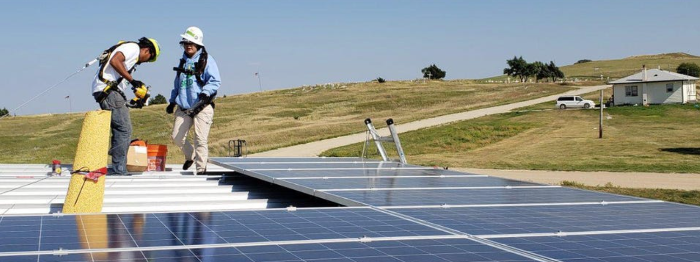
Monday, May 2, 2022
1:30 PM ET
Indigenous Shareholder Advocacy & Leadership Training: Operationalizing FPIC in the Transition to Net Zero
A worldwide transition to a low-carbon economy is underway to curb societal dependence on fossil fuels and to accelerate cleaner energy alternatives. Without a shift from harmful extractive patterns, however, the increased dependence on minerals necessary for this transition will carry the same threats and harms to Indigenous communities. How can Indigenous Peoples advocate for their rights and protect their lands and resources at every level of the transition minerals supply chain? How can Indigenous leaders engage with shareholders and investors to better align human rights with corporate ESG and social impact commitments?
Hosted by First Peoples Worldwide, which works alongside Indigenous communities and enterprises globally to advocate for Indigenous rights in the capital markets, this Shareholder Advocacy & Leadership Training (SALT) presents market-based strategies to advocate for development that occurs with the free, prior, and informed consent (FPIC) of Indigenous Peoples. Information, case studies and resources will be provided to help Indigenous Peoples harness and mobilize shareholder and investment strategies to target the companies that are proposing harmful projects. The training also offers practical tools to protect Indigenous rights and resources, paving a path towards a just transition to net zero economy that protects the culture and wellbeing of Indigenous Peoples and telegraphs risks to business of failure to respect FPIC.
Partner Organization: First Peoples Worldwide and Cultural Survival
RSVP
Wednesday May 4, 2022,
1:00pm- 2:30pm EST
Teach-in: How to Maximize Your Advocacy Effectiveness using the Universal Periodic Review, Treaty Bodies, and the High-Level Political Forum to Advocate for Indigenous Rights
Come learn about international human rights mechanisms, including the Universal Periodic Review (UPR) and UN Treaty bodies, the High-Level Political Forum on Sustainable Development (HLPF), Paris Agreement Nationally Determined Contributions after HLPF, and how they can aid in your advocacy efforts and put pressure on governments, locally, nationally, and globally, to respect Indigenous Peoples’ rights.
Presentation by Joshua Cooper, Executive Director, Oceania Human Rights & Dean, Global Leadership Academy for Human Rights Advocacy.
REGISTER: https://tinyurl.com/unpfii04
Language availability English/Spanish
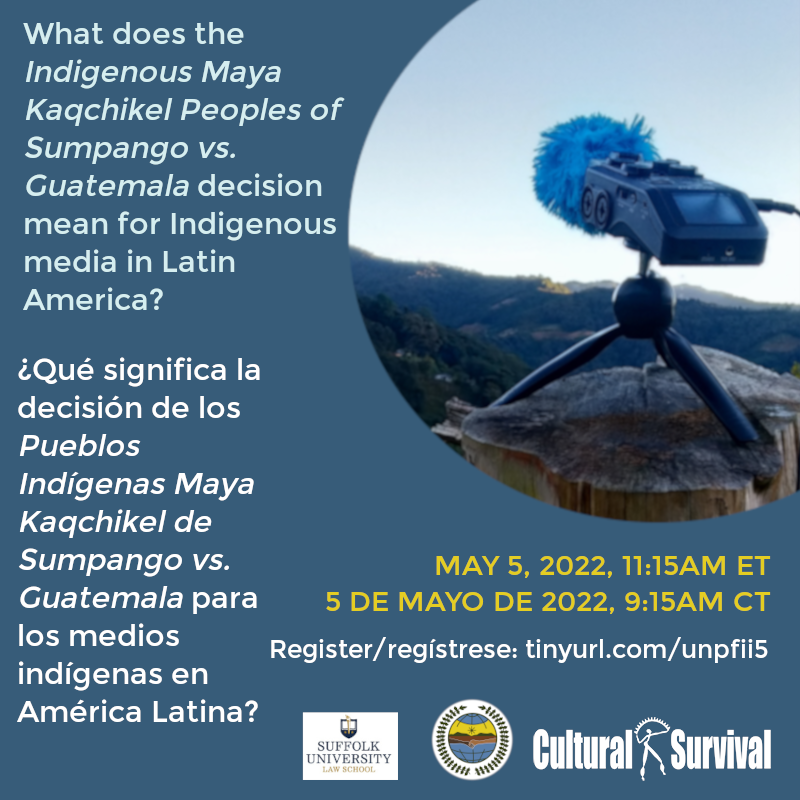
Thursday, May 5, 2022
11:15am-12:45pm EST
What does the Indigenous Maya Kaqchikel Peoples of Sumpango vs. Guatemala decision mean for Indigenous media in Latin America?
This session will present briefly the recent historic decision of the Inter-American Court of Human Rights, Indigenous Maya Kaqchikel Peoples of Sumpango vs. Guatemala and explain how the decision will affect Indigenous Peoples’ exercise of the right to freedom of expression in Latin America.
Speakers:
Amy Chavaro, Suffolk University Law School
Anelio Merry (Panama)
Donofre Chuque (Peru)
Mariano (México), CLAPI
Dora Muños (COLOMBIA)
Co-Sponsors: Suffolk University Law School
REGISTER: https://tinyurl.com/unpfii5
Language availability English/Spanish
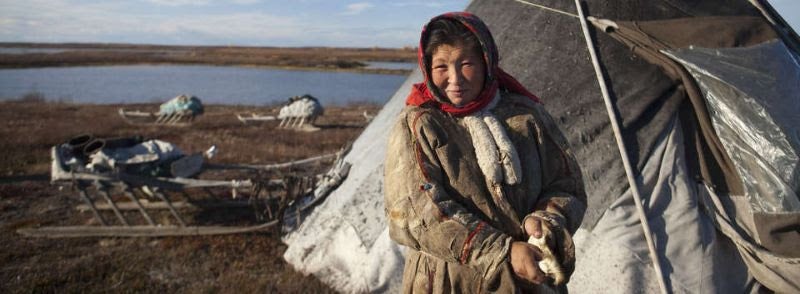
Thursday, May 5, 2022
1:30 PM ET
Indigenous Solutions toward the New Energy Economy: Transition Minerals, Mining, and FPIC
Transition minerals such as cobalt, lithium, and nickel are critical to the development of a green, low-carbon economy. With increased mining of these resources, Indigenous People must defend their rights and territories to stop the desecration of sacred places, threat of pollution, and an increased risk of sexual violence and homicide that results from development that lacks adequate human rights due diligence. As witnessed with Rio Tinto’s Juukan Gorge project in Western Australia, Thacker Pass in the U.S., and the Atacama salt flat of northern Chile, the failure to obtain free, prior, and informed consent (FPIC) from impacted communities results in irrevocable harm to Indigenous communities, resources, and cultural heritage sites.
Hosted by a global, Indigenous-led coalition working to forward the rights of Indigenous Peoples in transition mineral development, this panel spotlights leaders on the frontlines of mining engagements. They will map the global ecosystem and share pathways towards a just transition to sustainable and economic and resource development that protects both long-term shareholder value and the rights and culture of Indigenous Peoples around the world.
Partner Organizations: First Peoples Worldwide, Cultural Survival, Batani, Earthworks, and Society for Threatened Peoples.
